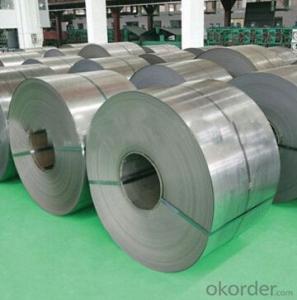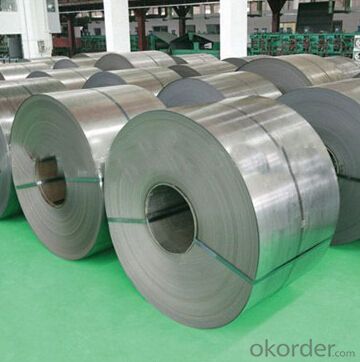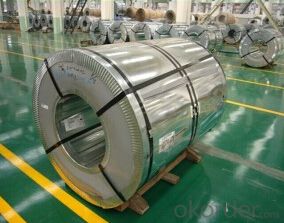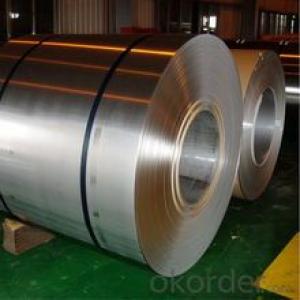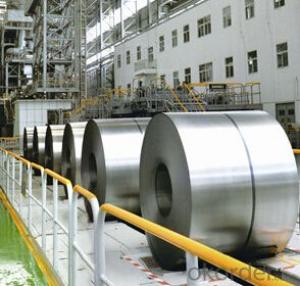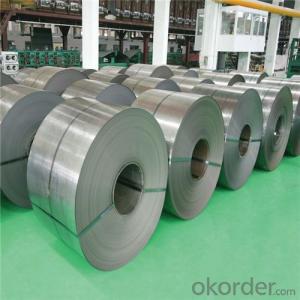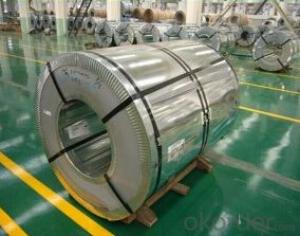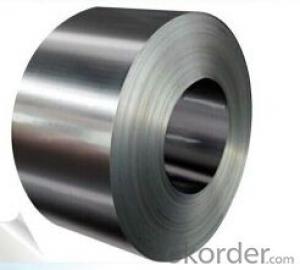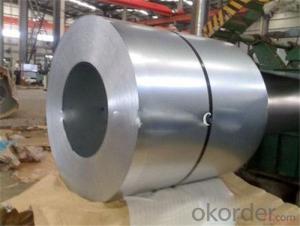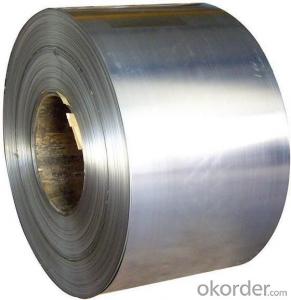304 Stainless Steel Coil Cold Rolled for Construction
- Loading Port:
- Shanghai
- Payment Terms:
- TT OR LC
- Min Order Qty:
- 25 m.t.
- Supply Capability:
- 50000 m.t./month
OKorder Service Pledge
OKorder Financial Service
You Might Also Like
cold rolled steel coils description:
Grade:300 Series
Standard: JIS,AISI,GB
Thickness: 0.16-3mm
Width: 15-500mm
Model Number: 304
Type: Coil
Application: home appliance
Certification: SGS, ISO
Surface: No.1,2B,4k,8k,HL
Color: natural color
Chemical composition:C 0.046% Cr 18.26
Quality: prime quality 304 stainless
Item:304 stainless steel
Specifications
304 stainless steel coil cold rolled
Width:15-500mm
Thickness: 0.16-3mm
Quality:High quality
Item | Stainless steel coil |
Technical | Hot rolled and cold rolled |
Standard | ASTM A240,GB/T3280-2007,JIS4304-2005,ASTM A167,EN10088-2-2005,GB/T3280-2007,EN10095-99,JIS4312,etc |
Material | 201,202,304,304L,309S,310S,316,316L,316Ti,430 |
Color | Golden, rose golden, titanium golden coating, champagne golden, brown, bronze, titanium black, sapphire blue, purple, gray, silver, coffee champagne, jade-green, etc |
Surface | NO.1,2b,4K,8k,HL |
Thickness | 0.3-15mm |
Width | 3-1500mm |
Length | could be cut into any size as per customer's request. Usually our common sizes : 1219mm*2438mm (4*8ft), 1219mm*3048mm (4*10ft) and 1000mm*2000mm. |
Price term | FOB,CFR,CIF |
Packing | cover with PVC, and wooden case, or customize package. |
Application | Architectural decoration, luxury doors, wall decoration plate, elevators decorating, KTV indoor decoration, metal tank shell, ship building, decoration inside the train, as well as outdoor works, advertising name plate, the ceiling and cabinets, aisle panels, screen, the tunnel project, hotels, guest houses, entertainment place, kitchen equipment, light industrial and others |
Advantage | colorful, showing the splendor of your quality, wear-resistant as well, strong corrosion resistance , anti-rust property and decorative effect, durable and beautiful in good taste. |
Cold Rolled Stainless Steel Coil:
Thickness: 0.3mm-6mm
Width: 5mm-1250mm
Surface: 2B, BA,
Usual model(mm)
0.3*1000/1219/1250*C 1.0*1000/1219/1250*C 5.0*1000/1219/1250*C 0.4*1000/1219/1250*C 1.2*1000/1219/1250*C 6.0*1000/1219/1250*C 0.5*1000/1219/1250*C 1.5*1000/1219/1250*C 0.6*1000/1219/1250*C 2.0*1000/1219/1250*C 0.7*1000/1219/1250*C 2.5*1000/1219/1250*C 0.8*1000/1219/1250*C 3.0*1000/1219/1250*C 0.9*1000/1219/1250*C 4.0*1000/1219/1250*C
Applications of Stainless Steel Coil:
1.Automotive: Automotive trim and molding/Difficult-to-form exhaust-system components, tubular manifolds, mufflers/Exhaust manifold and other exhaust-system components, catalytic converter shells, clamps
2. Construction: Gutters and downspouts, roofing, siding
3. Kitchenware: Cooking utensils, dishwashers, ovens, range hoods, refrigerators, skewers 4.Chemical processing: Oil refinery equipment, oil burner and heater parts
5. Appliances: Hot water tanks, residential furnaces
6. Power generation: Heat Exchanger tubing
7. Farming: Dry fertilizer spreaders/Farm animal pens
- Q: What are the different coil leveling methods used for steel coils?
- There are several coil leveling methods used for steel coils, each with its own benefits and limitations. Here are some of the most common methods: 1. Roller Leveling: In this method, steel coils are passed through a series of rollers that apply pressure to flatten and level the coils. Roller leveling is effective in reducing coil crown or center buckle, and it can also help eliminate coil memory. However, it may not be suitable for coils with severe shape defects or variations. 2. Stretch Leveling: This method involves stretching the steel coils to remove any shape defects. The coils are passed through a series of gripper heads that hold the edges of the coil while it is stretched. Stretch leveling is particularly effective in correcting crossbow and edge wave defects. However, it may cause some elongation and yield loss in the material. 3. Temper Pass: This method involves passing the steel coils through a series of temper mill stands, where they are subjected to tension and compression forces. Temper pass leveling helps improve flatness and remove coil memory. It is commonly used for thinner gauge steel coils but may not be suitable for thicker coils. 4. Corrective Leveling: This method is used for coils with severe shape defects. It involves selectively removing material from specific areas of the coil to correct the shape. Corrective leveling is a labor-intensive process that requires skilled operators, but it can effectively eliminate shape defects and improve flatness. 5. Tension Leveling: In this method, the steel coils are subjected to tension forces while being passed through a series of pinch rolls. Tension leveling helps remove coil memory and improve flatness. It is particularly effective for coils with edge wave defects. However, it may cause some elongation and yield loss in the material. These are just a few of the coil leveling methods used for steel coils. The choice of method depends on the specific requirements of the steel coils and the desired flatness results. It is important to consider factors such as material thickness, shape defects, and production capacity when selecting the appropriate leveling method.
- Q: Does anyone know what is 12 gage Cold Rolled Steel meaning? Also, help me to describe it.Thank you so muck ~!Mark Lin
- It's gauge.
- Q: i need working shoes for women that have steel toe shoes? What store do they sell them in . i live in c.a.
- Do a search for local safety toe shoes. I have to have them for work also, and as a woman I can't just go to Walmarts. Unfortunately the store I go to is here in Atlanta, so not much help. But there are specialty stores for safety shoes. Brands I like are Hytest and Georgia Boots. Especially the Hytest instead of steel toes which are heavy the toes are kevlar.
- Q: Can steel coils be coated with PVC?
- Yes, steel coils can be coated with PVC.
- Q: How are steel coils processed and shaped into various products?
- Steel coils are processed and shaped into various products through a series of manufacturing processes. First, the steel coil is uncoiled and cleaned to remove any impurities. Then, it goes through a process called leveling, where the coil is flattened and straightened. Next, the steel is cut into the desired length or shape, using techniques like shearing or slitting. After that, it may undergo additional processes such as forming, bending, or rolling to give it the desired shape. Finally, the steel is often treated with coatings or finishes to enhance its durability and appearance.
- Q: What is the role of steel coils in the production of fencing materials?
- Steel coils play a crucial role in the production of fencing materials as they serve as the primary raw material for manufacturing wire mesh used in fences. These coils are unrolled and processed by machines to create the required gauge and size of wire. The wire is then woven or welded to form the fencing mesh, providing strength, durability, and security to the final product.
- Q: Does a magnet stick to galvinied steel?
- yes it does. The steel below the galvanized coating still has a relative high carbon content and magnets stick to it. Magnets do not stick to stainless steel very well though. There is a weak attraction there. If I recall correctly this is due to the relatively low carbon content and the higher content of chromium.
- Q: Which of the two are better for exhaust manifolds, im guessing the stainless steel right?
- stainless
- Q: In what ways can steel fail in use of buildings ad what can be done to prevent it?
- we fireproof steel in buildings now if thats what your talking about
- Q: I need details for steel column splices welded or bolted. References or autocad blocks will be very useful. Thank you very much!
- The refernce for Canada is S16-01 Limit states steel design My professor always taugth us shop weld field bolt if that helps
Send your message to us
304 Stainless Steel Coil Cold Rolled for Construction
- Loading Port:
- Shanghai
- Payment Terms:
- TT OR LC
- Min Order Qty:
- 25 m.t.
- Supply Capability:
- 50000 m.t./month
OKorder Service Pledge
OKorder Financial Service
Similar products
Hot products
Hot Searches
Related keywords
